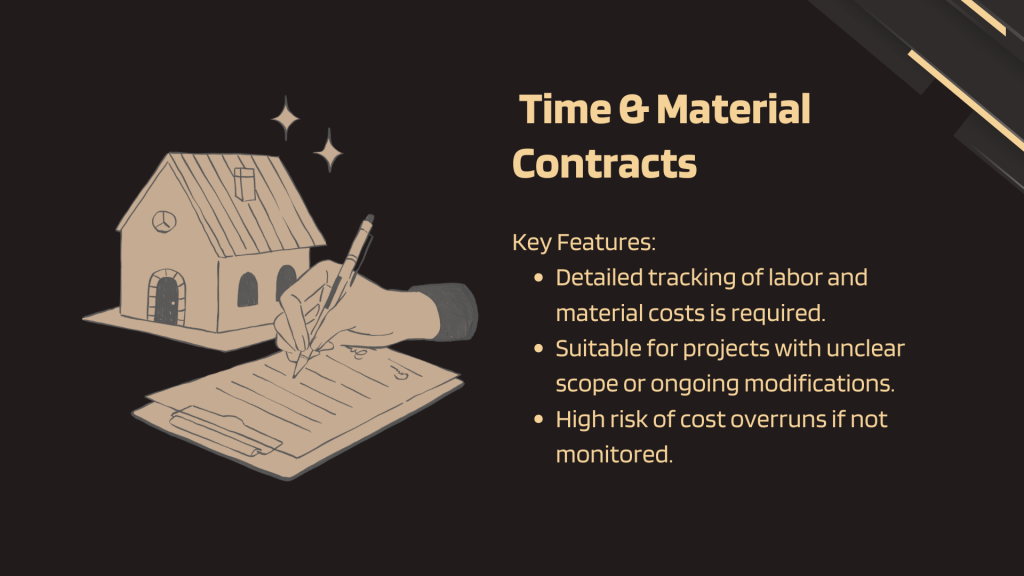Types of Construction Contracts in India

The construction industry is one of the largest industries in India. It is the backbone of infrastructure development. You may see many construction projects in process. Behind every construction project there are construction contracts which are legally bound agreements that state the roles, responsibilities, and obligations of all the parties involved. Let’s get to know about the types of construction contracts in India.
Types of Construction Contracts
1. Unit Price Contract

The Unit Price Contract is one of the common contracts used in the construction industry. This contract works on a unit rate that provides a fixed rate of every unit of work like per square meter of flooring, per cubic meter of concrete, or per ton of steel. This contract includes a detailed BOQ which specifies each work item, and its unit rate and payments are done according to actual quantities of work completed.
Advantages of Unit Rate Contracts:
- Flexibility for Scope Changes
- Transparency in Costs
- Simplified Risk Management
Disadvantages of Unit Rate Contracts:
- Time-Consuming Measurement
- Potential for Disputes
- Uncertain Final Cost
2. Lump-Sum Contracts

In Lump Sum Contract (also known as Fixed Price Contracts) the payment is predetermined. The contractor provides the final cost which is fixed and will be used in the project. This helps with clarity and transparency in the budget. It is a straightforward approach to get a contract.
Advantages of Lump-Sum Contract:
- Cost Predictability
- Simplified Management
- Incentivizes Efficiency
Disadvantages of Lump-Sum Contract:
- Risk to Contractors
- Scope Rigidity
- Higher Initial Pricing
3. Cost-Plus Contracts

Under this contract, every expense during the construction project is paid for. The contractor is also provided a pre-agreed cost. This contract is suitable for complex projects where the exact scope is uncertain.
Advantages of Cost-Plus Contract:
- Scope Flexibility
- Transparency in Cost
- High-Quality Results
Disadvantages of Cost-Plus Contract:
- Lack of Cost Control
- Administrative Burden
- Potential for Overbilling
4. Turnkey Contracts

In Turnkey Contracts, everything is a contractor’s responsibility. From design to the whole construction, the contractor takes care of it. Client just demands a ready-to-use structure with less involvement in the projects. These contracts are more suitable for industrial and large-scale infrastructure projects.
Advantages of Turnkey Contracts:
- Single Point of Responsibility
- Time Efficiency
- Ready-to-Use Delivery
Disadvantages of Turnkey Contracts:
- Higher Initial Costs
- Limited Client Control
- Risk of Subpar Quality
5. Time and Material Contracts

This contract is one of the common types of construction contract. Based on whatever time and cost that has been spent on a site, a contractor charges the client according to that. This helps in providing flexibility in the work and cost of the project. There is no fixed price in this contract.
Advantages of Time and Material Contract:
- Ideal for Small Projects
- Transparency
- Flexibility
Disadvantages of Time and Material Contract:
- Uncertain Total Cost
- High Monitoring Requirement
- Limited Contractor Accountability
Also Read: The Importance of Workforce Management Software in Construction
Conclusion
To have the knowledge of these contracts are necessary if you are a contractor or a client. This helps you make the right decision and let you choose the best for your construction business. Choosing the right contract depends on many factors like project size, complexity, scope, and risk tolerance. Understanding these contracts will give you clarity, efficiency, and success. So, if you are someone who is looking for the knowledge of types of construction contracts then this article is for you.
FAQs
1. What is a construction contract?
A construction contract is a legally binding agreement that outlines the roles, responsibilities, and obligations of all parties involved in a construction project. It ensures clarity and defines terms related to payment, scope of work, timelines, and risk allocation.
2. What are the main types of construction contracts in India?
The main types of construction contracts in India include:
- Unit Price Contract
- Lump-Sum Contract
- Cost-Plus Contract
- Turnkey Contract
- Time and Material Contract
3. What is a Unit Price Contract?
A Unit Price Contract works on fixed rates for each unit of work, such as per square meter of flooring or per cubic meter of concrete. Payments are based on the actual quantities of work completed, which are measured and verified during the project.
4. Who benefits most from Turnkey Contracts?
Clients who prefer minimal involvement in the construction process and require a fully operational project upon completion benefit most from Turnkey Contracts.
